Charles Augustus Briggs Collection (15 vols.)
Digital Logos Edition
This product has been transferred from Community Pricing to Pre-Pub. The actual funding level may be lower than it appears, which could delay production. The amount of funding still needed will be evaluated and updated soon.
Overview
The Charles Augustus Briggs Collection contains the works of esteemed scholar and theologian Charles Augustus Briggs. The collection includes his original Inaugural Address, his three part Messianic Ideal Series, (a guide to biblical study fitting for any scholar or interested layperson) and several other prominent works. The collection highlights Briggs’s Presbyterian background through books such as American Presbyterianism: Its Origins and Early History, and it includes his comparative views of core theological beliefs from other denominations.
Explore the implications of prophecy with Brigg’s three-part Messianic Ideal Series. Throughout the books, Briggs traces the growth of the Messianic idea in the Old Testament and the Gospels, and discusses the contribution of the Apostles to its development. Additional works such as The Virgin Birth of Our Lord and The Higher Criticism of the Hexateuch give insight into the theological beliefs Briggs formed through years of scholarly research and studying.
With the Logos edition, the Charles Augustus Briggs Collection integrates seamlessly into your digital library. Study faster with lightning-fast searches that span your entire library with just the click of a button. Search by topic or Scripture reference and Logos opens the books you need to the right page. Access maps and charts, and watch as major events connect to the Timeline automatically, giving you instant historical context.
Key Features
- Original version of The Inaugural Address on the Authority of Holy Scripture
- Essays by L. J Evans and H. P. Smith in response to Briggs' Inaugural Address
- Charles Augustus Briggs’ Messianic Ideal Series
- Maps of historically significant American Presbyterian settlements
- Briggs’ interpretations of the Hexateuch
Individual Titles
- The Authority of Holy Scriptures: An Inaugural Address
- The Bible, the Church, and the Reason: The Three Great Fountains of Divine Authority
- Inspiration and Inerrancy
- Messianic Prophecy: The Prediction of the Fulfilment of Redemption through the Messiah
- The Messiahs of the Gospels
- The Messiah of the Apostles
- Biblical Study: Its Principles, Methods, and History
- American Presbyterianism: Its Origin and Early History
- Biblical History
- Whither? A Theological Question for the Times
- The Higher Criticism of the Hexateuch
- General Introduction of the Study of Holy Scripture: The Principles, Methods, History, and Results of Its Several Departments and of the Whole
- New Light on the Life of Jesus
- The Ethical Teaching of Jesus
- The Virgin Birth of Our Lord
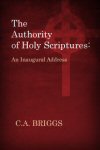
The Authority of Holy Scriptures: An Inaugural Address
- Author: Charles Augustus Briggs
- Edition: 2nd
- Publisher: Charles Scribner’s Sons
- Publication Date: 1891
- Pages: 103
This volume contains Briggs’ inaugural address on the Authority of Holy Scripture that was delivered on January 20, 1981 in the Adams chapel of the Union Theological Seminary.
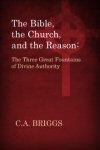
The Bible, the Church, and the Reason: The Three Great Fountains of Divine Authority
- Author: Charles Augustus Briggs
- Edition: 2nd
- Publisher: Charles Scribner’s Sons
- Publication Date: 1893
- Pages: 1899
The Bible, the Church, and the Reason contains seven of Briggs’ lectures, five of which more comprehensively describe his views set forth in his Inaugural Address.
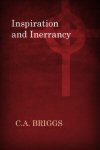
Inspiration and Inerrancy
- Authors: Charles Augustus Briggs, Alexander Balmain Bruce, Llewellyn J. Evans, and Henry Preserved
- Publisher: J. Clarke
- Publication Date: 1891
- Pages: 296
Inspiration and Inerrancy includes essays by LLewellyn J. Evans and Henry Preserved Smith in response to Briggs’ Inaugural Address. It also includes and Introduction by Alexander Balmain Bruce.
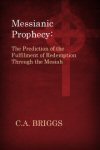
Messianic Prophecy: The Prediction of the Fulfilment of Redemption through the Messiah
- Author: Charles Augustus Briggs
- Edition: 8th
- Series: Messianic Ideal
- Publisher: Charles Scribner’s Sons
- Publication Date: 1902
- Pages: 524
In Messianic Prophecy, Briggs provides a study of the messianic passages of the Old Testament.
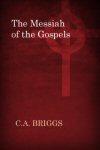
The Messiahs of the Gospels
- Author: Charles Augustus Briggs
- Series: Messianic Ideals
- Publisher: Charles Scribner’s Sons
- Publication Date: 1894
- Pages: 336
This is an expansion of Messianic Prophecy and tracks how the prophecies described in the earlier book have been fulfilled or unfulfilled.
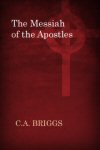
The Messiah of the Apostles
- Author: Charles Augustus Briggs
- Series: Messianic Ideals
- Publisher: Charles Scribner’s Sons
- Publication Date: 1895
- Pages: 563
This book traces the history of the Messianic ideal in the Christian church and shows its importance in the development of Christian doctrine.
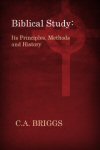
Biblical Study: Its Principles, Methods, and History
- Author: Charles Augustus Briggs
- Edition: 2nd
- Publisher: Charles Scribner’s Sons
- Publication Date: 1894
- Pages: 514
Briggs spent many years studying the bible and theology in general. In this book he summarizes the purpose of his study, his preferred methods, and key resources he used.
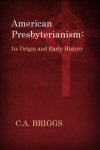
American Presbyterianism: Its Origin and Early History
- Author: Charles Augustus Briggs
- Publisher: Charles Scribner’s Sons
- Publication Date: 1885
- Pages: 530
In this volume, Briggs includes several documents, letters, and maps that help readers understand the origin and early history of American Presbyterianism.
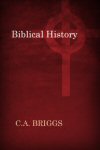
Biblical History
- Author: Charles Augustus Briggs
- Publisher: Charles Scribner’s Sons
- Publication Date: 1889
- Pages: 62
This volume contains Briggs’ opening lecture from the Union Theological Seminary in 1889. In this lecture, he describes a branch of history separate from the history of Israel and theological history. This branch is Biblical history and it is the history contained in the Scriptures of the Old and New Testaments.
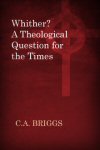
Whither? A Theological Question for the Times
- Author: Charles Augustus Briggs
- Publisher: Charles Scribner’s Sons
- Publication Date: 1889
- Pages: 307
Wither is the result of more than twenty years of study on the history of Puritan theology. Briggs discusses many theological questions and gives historical information on the Westminster Divines.
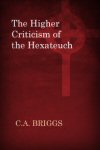
The Higher Criticism of the Hexateuch
- Author: Charles Augustus Briggs
- Publisher: Charles Scribner’s Sons
- Publication Date: 1893
- Pages: 269
After years of research, study, and waiting, Briggs was able to access the (at the time) newly published Hebrew Lexicon to provide a comprehensive and complete analysis of the Hexateuch. This analysis includes commentary, investigation of traditional theories and hypotheses, as well as a timely examination of the theories of the late 19th century.
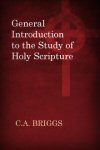
General Introduction of the Study of Holy Scripture: The Principles, Methods, History, and Results of Its Several Departments and of the Whole
- Author: Charles Augustus Briggs
- Publisher: Charles Scribner’s Sons
- Publication Date: 1899
- Pages: 702
As a result of Briggs’ Biblical Study: Its Principles, Methods and History, he was asked to give special attention and elaborate on particular themes from the book in public addresses and review form. Developed over the course of 14 years, this book contains a compilation of expansionary material that add to the themes from Briggs’ original work.
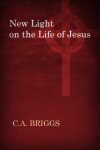
New Light on the Life of Jesus
- Author: Charles Augustus Briggs
- Publisher: Charles Scribner’s Sons
- Publication Date: 1904
- Pages: 204
In this volume Briggs offers new insights into the life of Jesus Christ. He arranges the book in a chronological order and he also traces the Messianic idea through history from its origin.
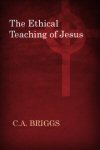
The Ethical Teaching of Jesus
- Author: Charles Augustus Briggs
- Publisher: Charles Scribner’s Sons
- Publication Date: 1904
- Pages: 307
The Ethical Teaching of Jesus is a compilation of lectures from Briggs’ time at the Union Theological Seminary.
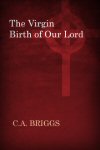
The Virgin Birth of Our Lord
- Author: Charles Augustus Briggs
- Publisher: Charles Scribner’s Sons
- Publication Date: 1909
- Pages: 56
This volume was originally prepared for the Presbyterian Minister’s Association of New York in 1907 and leads a discussion on the validity and importance of the virgin birth of Jesus. Briggs later revisited this work and his revisions are reflected in this version.
Product Details
- Title: Charles Augustus Briggs Collection
- Authors: Charles Augustus Briggs, Alexander Balmain Bruce, LLewellyn J. Evans, and Henry Preserved
- Publishers: Charles Scribner’s Sons, J. Clarke, and Thomas Whittaker
- Volumes: 15
- Pages: 5,068
About Charles Augustus Briggs
Charles Augustus Briggs (1841–1913) was a theologian and Hebrew scholar. Born in New York City, he was educated at the University of Virginia (1857–1860), graduated from the Union Theological Seminary in 1863, and studied further at the University of Berlin. He was pastor of the Presbyterian Church of Roselle, New Jersey, and professor of Hebrew and cognate languages at Union Theological Seminary. From 1880 to 1890, he was an editor of the Presbyterian Review. In 1892, he was tried for heresy by the presbytery of New York and acquitted; the general assembly, however, suspended Briggs in 1893. He was ordained a priest of the Protestant Episcopal Church in 1899. He has been awarded many honorary degrees and is the author of many publications.
Customers also bought
The Speaker's Commentary (13 v...
$455.95$119.99Livy's History of Rome (28 vol...
$204.99$174.99Classic Commentaries and Studi...
$249.95$159.95Classic Commentaries and Studi...
$194.95$119.99